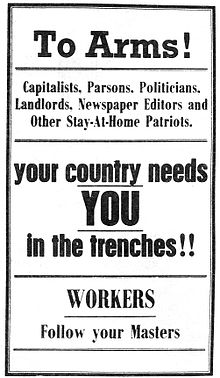Tom Barker
Tom Barker (born June 3, 1887 in Crossthwaite , Westmorland , Great Britain , † April 2, 1970 in London ) was a trade unionist for the international Industrial Workers of the World and a politician in New Zealand and Australia .
biography
He was the eldest child of farm worker Thomas Grainger Barker and his wife Sarah, nee Trotter. As a boy he worked on the farm until he was 11 years old and then in a dairy until he was 14 years old. He then went to Liverpool and in 1905 to the military, to the cavalry . Due to health problems with his heart, he left the army and worked on the railroad in Liverpool. In 1909 he emigrated to New Zealand and worked in Auckland as a conductor on the tram.
He married Bertha Isaakovna, a Polish- born ballet dancer .
politics
New Zealand
In New Zealand he became an active trade unionist and secretary of the New Zealand Socialist Party . In 1913 he influenced the political orientation of the Industrial Workers of the World (IWW) for a socialist perspective. In 1913 he headed the Auckland General Strike for the IWW and was imprisoned in Wellington in 1913 on charges of conspiracy.
Australia
In early 1914 he went to Sydney and held the post of editor of the IWW magazine Direkt Action . There he stood up for the rights of black workers and campaigned for equal wages for blacks and women. In 1915 he was sentenced to 12 months in prison for conspiracy and released in March 1916 after a public campaign. The words Barker uttered after his arrest are said to have been: "For every day that Tom Barker is in gaol it will cost the capitalist class £ 10,000." (Every day that Tom Barker was incarcerated, the capitalist class will cost £ 10,000. )
In 1916 the enthusiasm for war in Australian society had subsided, it was deeply divided and political life was shaped by the dispute over conscription , the anti-war movement "NO" and by political hindrances and the arrests of trade unionists as conspirators. At that time, the politics of the Australian Prime Minister Billy Hughes , then a member of the Australian Labor Party , which later expelled him because of his right-wing conservative politics, whereupon he founded the Nationalist Party in order to be able to continue to rule, played an essential role .
Barker stood up for twelve arrested IWW unionists, known as the Sydney Twelve , on charges of conspiracy. According to the Unlawful Associations Act (1916) , which was passed by the federal parliament on the initiative of the Hughes government in December 1916, the unionists were members of a conspiratorial organization as IWW members. Barker is credited with distributing and designing Australia's famous anti-war and anti-conspiracy poster: TO ARMS !! Capitalists, Parsons, Politicians, Landlords, Newspaper Editors, and Other Stay-at-Home Patriots. Your Country Needs You in the Trenches! Workers, Follow Your Masters! . Another poster, which goes back to him and was distributed by him, shows a soldier crucified on a wheeled cannon while Mr. Fat fills his glass with war profits. This poster was the reason for his arrest and imprisonment. When he was released in 1918, he was deported to Chile .
Other countries
In Chile and Argentina he organized seafarers on strike . He recruited technicians in the USA for the Soviet Union and their Kuzbass project until 1926. He later worked for a Soviet oil company. Between 1930 and 1931 he returned to Australia and then went to London, where he worked as an employee of an electrical power company. He joined the Labor Party in the UK and was elected to St Pancras Borough City Council. He is said to be known there to this day because he hoisted a red flag as mayor on May 1st.
He remained politically active until the end of his life and died in London in 1970 at the age of 83.
Working-class culture
His name has entered the songs of the labor movement. In the song Fan the Flames of Discontent , which was sung by Andy Irvine , the life and political work of Tom Barker is discussed in detail.
literature
- Eric Fry: Barker, Tom (1887-1970) . In: Douglas Pike (Ed.): Australian Dictionary of Biography . Volume 7: 1891 - 1939. A - Ch . Melbourne University Press, Carlton Victoria 1979, ISBN 0-522-84185-6 , pp. 174-175.
Individual evidence
- ↑ a b c Fellow Worker Tom Barker on iww.org , accessed March 28, 2010
- ↑ Tom Barker on Australian Dictionary of Biography , accessed March 18, 2010
- ↑ a b c Andy Irvine: Gladiators. Labor History in Songs on historycooperative.org ( page no longer available , search in web archives ) Info: The link was automatically marked as defective. Please check the link according to the instructions and then remove this notice. , accessed March 28, 2010
| personal data | |
|---|---|
| SURNAME | Barker, Tom |
| BRIEF DESCRIPTION | Union leaders and politicians in Australia and New Zealand |
| DATE OF BIRTH | June 3, 1887 |
| PLACE OF BIRTH | Crossthwaite , Westmorland , UK |
| DATE OF DEATH | April 2nd, 1970 |
| Place of death | London |
